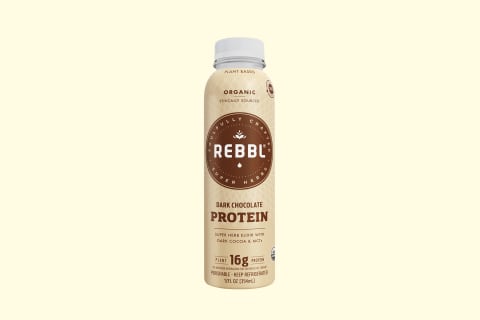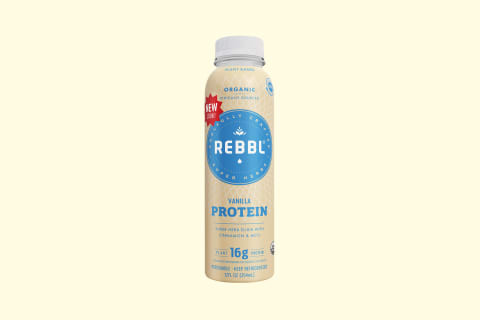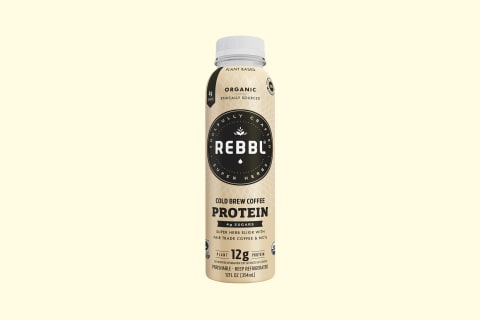Advertisement
3 Adaptogens To Power Up Your Plant Protein

It's 2020: Veganuary is the new Dry January, plant-based diets are topping the charts for healthy living, and we're (finally) globally cutting down our meat consumption for the greater good of the planet. The spotlight in recent years has centered solidly around the plant vs. animal protein conversation, and thanks to the current body of major scientific health research1, it's safe to say that the trend toward plant-based protein isn't a trend at all—but here to stay.
If your New Year's resolutions and intentions have you hitting the gym more than before, training for a big race, or even just prioritizing movement every day, you're probably well acquainted with why you need clean protein in your diet. But there's another power player in the plant world that can help you thrive on your way to hitting your goals: adaptogens!
"As a functional medicine practitioner, I have seen firsthand the powerful effects adaptogens can have on a person's health," says Will Cole, D.C., IFMCP. Read on to see how this unique class of herbs can help amp up your game in the long run.
Plant protein + adaptogens: a powerful combo when you're doing the most.
Protein is a vital macro when it comes to movement and recovery. It's responsible for making the hemoglobin that transports oxygen through our body and builds and maintains lean muscle. We pretty much got this part covered: These days, it's almost second nature to swing by our neighborhood grocery store or corner bodega post-workout for a delicious, clean protein drink like the ones by REBBL, which pack in 12 to 16 grams of plant-based protein in each bottle.
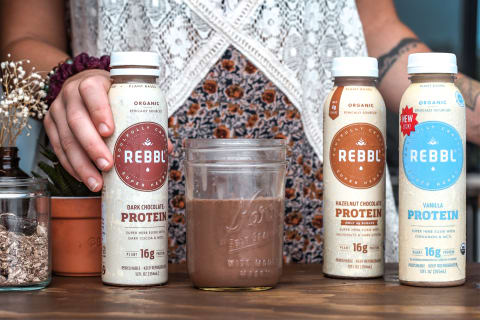
Yet we often forget that a big piece of sticking with our fitness goals is about supporting our body as it adapts to training and other stressors (aka, not burn out with exhaustion). That's where adaptogens come in.
Adaptogens help your body adapt to and cope with stress—which is especially helpful when you're regularly pushing your limits. Balancing in nature, adaptogens act as a sidekick helper to your adrenal system—the system that controls your body's hormonal response to stress—working to counteract the adverse effects2 of stress and help maintain healthy energy levels, mood, metabolism, immune function, and more.
Adaptogens help your body adapt to and cope with stress—which is especially helpful when you’re regularly pushing your limits.
Packed with phytochemicals, many of these plants have a long history of being used as natural health remedies across numerous cultures, both ancient and modern3, most popularly among functional health practitioners like Cole. So it's easy to see why brands like REBBL are sourcing (ethically, for the record!) some of the most well-researched adaptogens like turmeric, reishi, and maca for their organic protein-packed elixirs.
While each adaptogen has its own unique strengths, Cole's personal go-to's include this synergistic trio that specifically supports your endurance, stamina, and recovery:
Maca
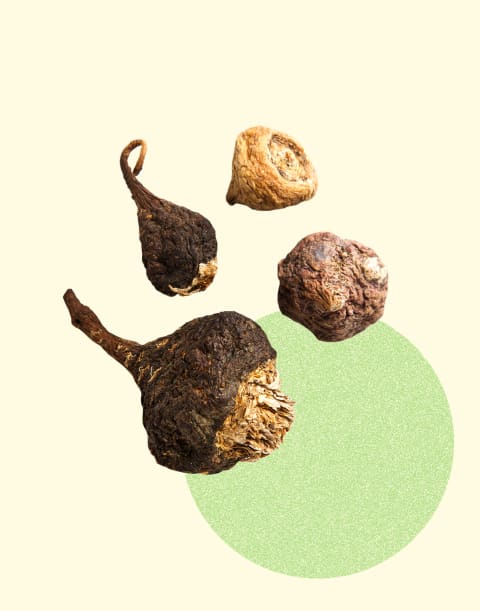
A cruciferous Peruvian plant high in vitamins and minerals that is often used as a natural substitute for caffeine to keep energy up. When it comes to physical activity, some studies have found that maca can help improve strength, exercise performance, even muscle gain. "I personally love adding in a little maca powder to my herbal tea if I need a little extra boost or REBBL Hazelnut Chocolate Protein after a workout," says Cole, "especially if I've already had coffee or caffeinated tea that day."
Ashwagandha
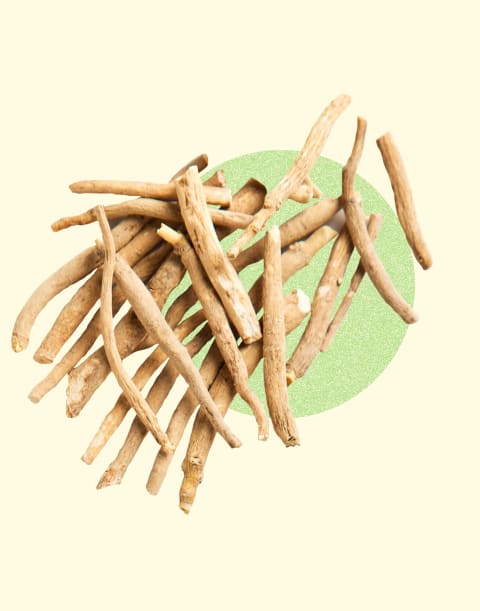
A woody plant native to India and North Africa (and a popular ayurvedic remedy) that is shown in studies to play a role in regulating and balancing out cortisol, your body's stress hormone. Other studies have found that ashwagandha may help support heart, thyroid, and immune function. "Ashwagandha can even help those struggling with anxiety," Cole explains. "In fact, one study showed that people who supplemented with ashwagandha for two months reduced their anxiety up to 44%."
Reishi
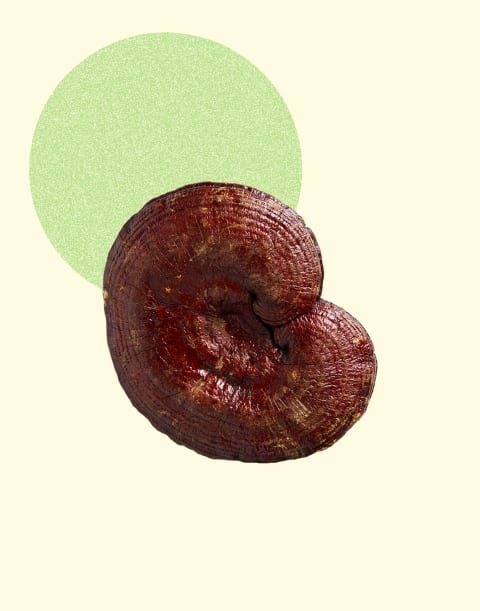
An Asian mushroom that has been linked with immune-boosting benefits4, including fighting fatigue5. Studies6 have shown reishi's effects on improving "good" cholesterol and lowering blood sugar levels. "This is especially important considering close to 50%7 of Americans are diabetic or prediabetic," Cole adds.
Where to find the protein + adaptogens pairing to support strength, stamina, and stress relief
You've probably already seen maca, ashwagandha, and reishi at your local health foods store in some form or another. While each adaptogen is commercially available as smoothie-ready powders, tinctures, tablets, and capsules, REBBL goes one step further and blends all three together with 12 to 16 grams of clean plant protein in several of their Plant Protein Elixirs, including Dark Chocolate, Vanilla, and Cold-Brew Coffee flavors. When it comes to the many drinks on the market, we opt for the ones with added boosts like REBBL.
Each nutrient-dense formula is ready to drink pre- or post-workout, or try adding to your favorite recipes as a dairy substitute. And with the added benefit of coconut milk MCTs providing a sustained source of smooth, clean energy, these protein elixirs are a total-package addition to your fitness routine. Made to help support strength, stamina, and stress relief while helping you feel satiated longer, it's like pulling a lever for plant-powered vitality.
So the next time you're at your local grocery store, you'll want to grab more than one. "REBBL Plant Protein Elixirs are my go-to when I am traveling, need a quick snack, or running out the door," adds Cole. "They are the perfect synergy of nutrients and flavor in a convenient, single bottle."
Shop this story:
*Please consult a trusted health care practitioner before making any decisions about your health.
7 Sources
- https://jamanetwork.com/journals/jamainternalmedicine/article-abstract/2748453
- https://www.ncbi.nlm.nih.gov/pmc/articles/PMC3991026/
- https://link.springer.com/chapter/10.1007/978-3-319-63862-1_1
- https://www.ncbi.nlm.nih.gov/pubmed/16230843
- https://www.ncbi.nlm.nih.gov/pubmed/15857210
- https://www.ncbi.nlm.nih.gov/pubmed/21801467
- https://jamanetwork.com/journals/jama/fullarticle/2434682

